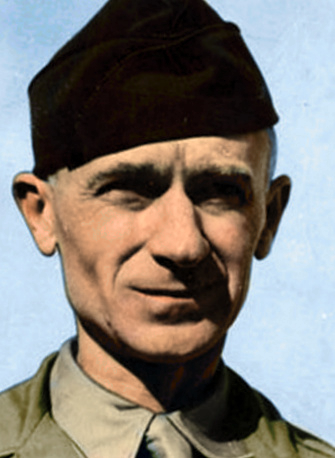The Pittsburgh Press (June 15, 1944)

Roving Reporter
By Ernie Pyle
Normandy beachhead, France –
The ship on which I rode to the invasion of the continent brought certain components of the second wave of assault troops. We arrived in the congested waters of the beachhead shortly after dawn on D-Day.
We aboard this ship had secretly dreaded the trip, for we had expected attacks from U-boats, E-boats, and at nighttime from aircraft. Yet nothing whatever happened.
We were at sea for a much longer time than it would ordinarily take to make a beeline journey from England to France. The convoy we sailed in was one of several which comprised what is known as a “force.”
As we came down, the English Channel was crammed with forces going both ways, and as I write it, still is. Minesweepers had swept wide channels for us, all the way from England to France. These were marked with buoys. Each channel was miles wide.
We surely saw there before us more ships than any human had ever seen before at one glance. And going north were other vast convoys, some composed of fast liners speeding back to England for new loads of troops and equipment.
As far as you could see in every direction the ocean was infested with ships. There must have been every type of oceangoing vessel in the world. I even thought I saw a paddlewheel steamer in the distance, but that was probably an illusion.
There were battleships and all other kinds of warships clear down to patrol boats. There were great fleets of Liberty ships. There were fleets of luxury liners turned into troop transports, and fleets of big landing craft and tank carriers and tankers. And in and out through it all were nondescript ships – converted yachts, riverboats, tugs and barges.
The best way I can describe this vast armada and the frantic urgency of the traffic is to suggest that you visualize New York Harbor on its busiest day of the year and then just enlarge that scene until it takes in all the ocean the human eye can reach, clear around the horizon. And over the horizon, there are dozens of times that many.
We were not able to go ashore immediately after arriving off the invasion coast amidst the great pool of ships in what was known as the “transport area.”
Everything is highly organized in an invasion, and every ship, even the tiniest one, is always under exact orders timed to the minute. But at one time, our convoy was so pushed along by the wind and the currents that we were five hours ahead of schedule, despite the fact that our engines had been stopped half the time. We lost this by circling.
Although we arrived just on time, they weren’t ready for us on the beaches and we spent several hours weaving in and out among the multitude of ships just off the beachhead, and finally just settled down to await our turn.
That was when the most incongruous – to us – part of the invasion came. Here we were in a front-row seat at a great military epic. Shells from battleships were whamming over our heads, and occasionally a dead man floated face downward past us. Hundreds and hundreds of ships laden with death milled around us. We could stand at the rail and see both our shells and German shells exploding on the beaches, where struggling men were leaping ashore, desperately hauling guns and equipment in through the water.
We were in the very vortex of the war – and yet, as we sat there waiting, Lt. Chuck Conick and I played gin rummy in the wardroom and Bing Crosby sang “Sweet Leilani” over the ship’s phonograph.
Angry shells hitting near us would make heavy thuds as the concussion carried through the water and struck the hull of our ship. But in our wardroom men in gas-impregnated uniforms and wearing lifebelts sat reading Life and listening to the BBC telling us how the war before our eyes was going.
But it isn’t like that ashore. No, it isn’t like that shore.
